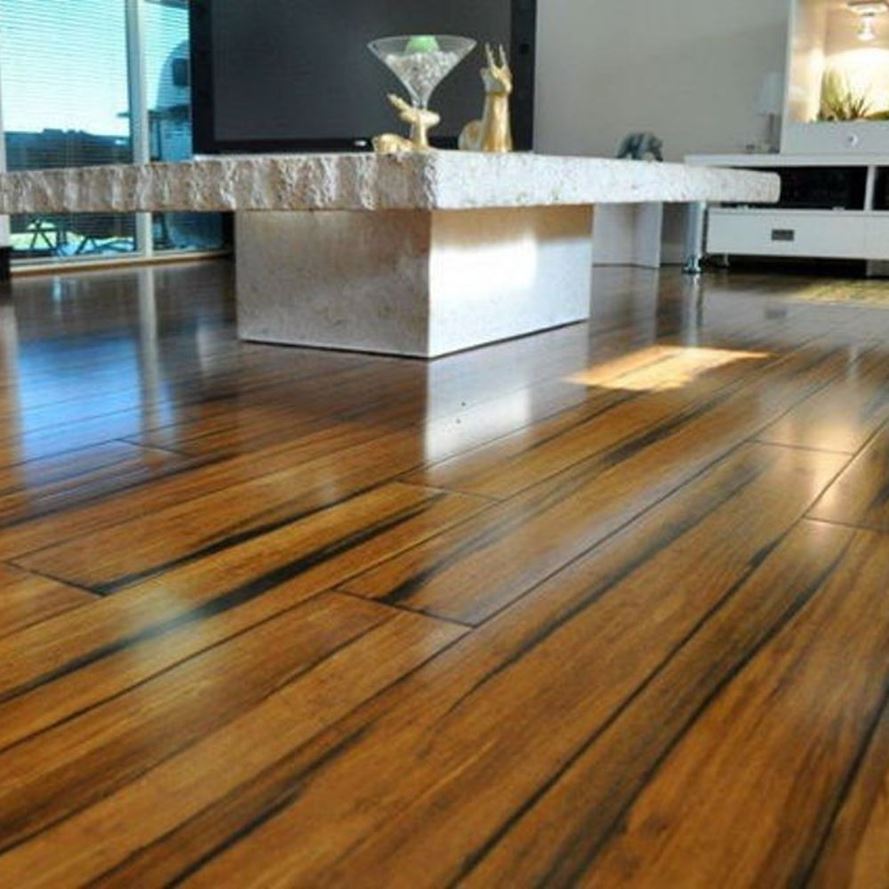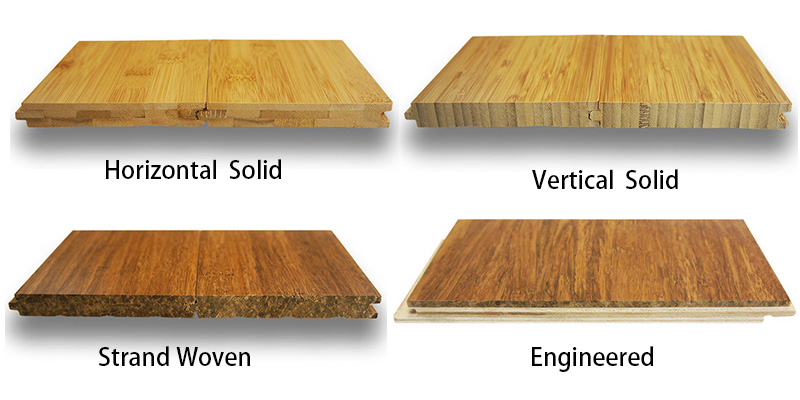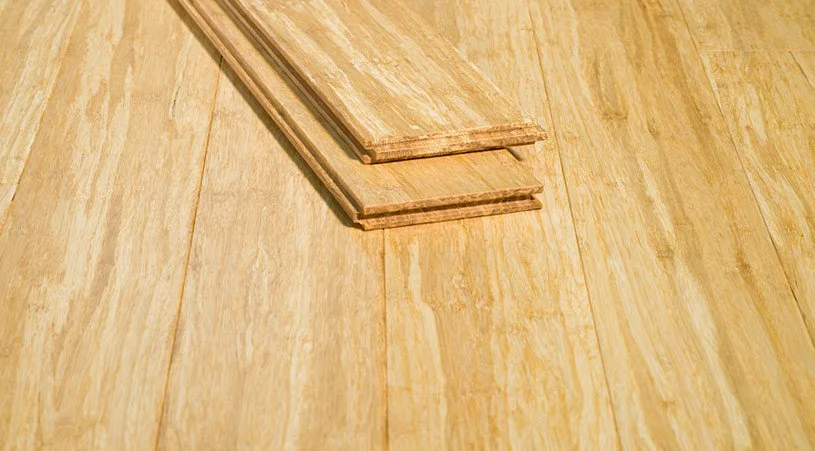24May 2023
Bamboo Flooring: The Ultimate Guide
Bamboo flooring is rapidly gaining popularity as a flooring option for homes and businesses around the world. It is an eco-friendly, high-quality alternative to traditional hardwood floors.

Brief history of bamboo flooring
Bamboo has been used in Asia for centuries as a building material due to its durability and strength. However, it wasn’t until the 1990s that bamboo began being used in North America as a flooring option.
As sustainable building materials became more popular in the West, bamboo emerged as an attractive alternative to traditional hardwoods.
Initially, there were some concerns with the quality of early bamboo flooring products. However, manufacturers have since refined their processes and improved product quality to meet consumer demand.
Why choose bamboo flooring
Bamboo provides numerous benefits over traditional hardwood floors. For one thing, it is much more environmentally friendly than hard woods like black butt or maple because it grows quickly and can be harvested every three to five years without damaging the plant or surrounding ecosystem.
In addition to being eco-friendly, bamboo floors are also highly durable and resistant to scratches or dents. They are also easy to maintain and keep clean with regular sweeping or mopping.
Bamboo floors also offer a unique aesthetic appeal with their distinct grain patterns which distinguish them from traditional hard woods.
Another major benefit is that bamboo flooring is typically less expensive than other types of hardwood floors while still providing comparable quality and durability.
Some people choose bamboo because it does not contain harmful chemicals found in some synthetic carpets or other forms of engineered wood products. If you’re considering renovating your home or office flooring, bamboo is an excellent option to consider.
Understanding Bamboo Flooring
Bamboo flooring is a type of hardwood flooring made from bamboo grass. It was first introduced in the market in the early 1990s and has since gained popularity due to its durability, affordability, and eco friendliness.
Bamboo plants are known for their fast-growing nature, making them a sustainable and renewable material source for flooring.
Types of bamboo flooring
There are three types of bamboo flooring:

- Solid bamboo: Solid bamboo is made from single strips of compressed and laminated bamboo stalks. It has a natural appearance with visible growth rings and knots on its surface.
- Engineered bamboo: Engineered bamboo consists of multiple layers of wood veneers that are glued together to create a stable base layer. The top layer is made up of finely sliced strands of flattened bamboos that form a smooth surface.
- Strand-woven bamboo: Strand-woven bamboo is the most durable type as it’s made by compressing shredded fibers from the bamboos’ stalks using heat and resin. This process makes it resistant to dents, scratches, and moisture.
How is it made?
The manufacturing process for producing bamboo flooring involves slicing matured bamboos into thin strips that undergo boiling to remove sugars and starches – this makes the material less susceptible to insect infestations – before drying. The dried strips are then glued together horizontally or vertically under high pressure to form long planks or sheets. They’re finished with either oil-based or water-based coatings.
Is Bamboo Flooring Eco-friendly?
Bamboo has a low environmental impact compared to other hard woods like oak or mahogany because it’s renewable (it takes about three years for a harvested plant to reach maturity again) abundant, biodegradable, recyclable and emits less CO2 than other materials.
The manufacturing process may involve using toxic chemicals like formaldehyde, which can have a negative impact on indoor air quality and health.
It’s essential to choose bamboo flooring that adheres to environmental standards and has VOC emissions certifications. It’s also vital to consider where the bamboo was sourced from: products made from certified organic or sustainably harvested bamboo are best for the environment.
Pros and Cons of Bamboo Flooring
Advantages of Using Bamboo Flooring
Bamboo flooring is increasingly becoming popular as an eco-friendly alternative to hardwood flooring. The following are some of the advantages of using bamboo flooring in your home:
| Eco-Friendly: | Bamboo is a highly renewable resource that grows quickly, making it a sustainable choice for flooring. Additionally, the production process for bamboo flooring uses fewer resources compared to hardwood flooring. |
| Durability: | One of the most impressive features of bamboo is its durability. It is harder than most hard woods and can withstand heavy traffic without showing much wear and tear. |
| Aesthetically Pleasing: | Bamboo floors come in a variety of colours and styles, ranging from natural light brown to darker shades resembling mahogany or walnut. |
| Low Maintenance: | Bamboo floors come in a variety of colours and styles, ranging from natural light brown to darker shades resembling mahogany or walnut. |
| Hypo-allergenic Properties: | Bamboo does not attract dust or allergens, making it an excellent option for those who suffer from allergies or asthma. |

Disadvantages of Using Bamboo Flooring
| Vulnerability to Moisture: | Bamboo floors can be sensitive to moisture and humidity fluctuations which may cause them to warp or buckle over time. |
| Susceptibility to Scratches: | Bamboo floorboards can be susceptible to scratches and dents due to their relatively soft surface compared with other hard woods. |
| Limited Design Options: | Bamboo’s unique grain patterns may limit design options when compared with other types of hardwood floors. |
| Manufacturing Quality: | Inferior quality bamboo flooring products may contain harmful chemicals or adhesives that could be hazardous to your health. |
| Cost: | Bamboo flooring can be more expensive than other types of wood floors due to its eco-friendly production process and growing popularity in the market. There are both advantages and disadvantages to using bamboo flooring in your home. |
While it is an eco-friendly and durable option, it may not be suitable for all households due to its sensitivity to moisture, susceptibility to scratches, and manufacturing quality concerns. It is important to weigh the benefits against the drawbacks when deciding on whether or not bamboo flooring is the right choice for your home.
Choosing the Right Bamboo Flooring for Your Home
Bamboo flooring is an excellent choice for home owners who want a beautiful and sustainable flooring option.
With so many different types of bamboo flooring available on the market, it can be challenging to choose the right one for your home. In this section, we will discuss several factors to consider when selecting bamboo flooring: durability, colour and style, cost, and installation process.
Durability
One of the most important things to consider when choosing bamboo flooring is durability. Not all bamboo floors are created equal: some are more durable than others. The hardness of bamboo varies depending on its species and age at harvest.
The harder the bamboo floor, the more resistant it will be to scratches and dents. The majority of bamboo flooring sold today is made from Moso bamboo species, which is known for its high durability.
However, within this species itself there are variations in quality. The best quality Moso Bamboo comes from China’s Anji region as it has a higher density and better quality fibres overall.
Colour and Style
Bamboo floors come in various colours ranging from natural shades of yellow to darker browns or greys that can mimic hard woods such as blackbutt or even engineered timber. It’s essential to choose a colour that matches your home’s aesthetic while still serving its purpose as a functional element.
Style-wise there are two main types of Bamboo flooring:
- traditional tongue
- groove solid planks (the most common)
- engineered planks (which provide greater installation flexibility).
With engineered planks you have more flexibility in terms of installation options but you lose some of the benefits provided by traditional tongue-and-groove planks like stability over time.
Is Bamboo flooring expensive?
The cost of bamboo floors vary depending on the quality, thickness, and style of the planks. Generally speaking, a higher quality bamboo floor will cost more than a lower quality one.
Expect to pay between $3-5 per square foot for standard solid bamboo and around $7-10 per square foot for engineered options. These prices can go up or down depending on factors such as thickness and manufacturer.
Where to buy Bamboo Floors in Australia?
- Bamboo Flooring Australia: Website: https://www.bambooflooring.com.au/
- Bamboo Floors: Website: https://www.bamboofloors.com.au/
- BT Bamboo: Website: https://btbamboo.com.au/
- Golden Field Bamboo Flooring: Website: https://www.goldenfield.com.au/
- Lion King Flooring: Website: https://www.lionkingflooring.com.au/
- Floorworld: Website: https://www.floorworld.com.au/
- Teragren: Website: https://www.teragren.com/
- Premium Floors: Website: https://www.premiumfloors.com.au/
- Eco Flooring Systems: Website: https://www.ecoflooring.com.au/
- Bunnings: Website: https://www.bunnings.com.au/
How To Install A Bamboo Floor
The installation process is an essential factor to consider when choosing bamboo flooring. It’s best to work with a professional installation team as they have the skills and experience necessary to ensure proper installation. The type of installation method you choose can also impact the durability of your new floor.
If you’re looking for an easy DIY option, click-lock bamboo flooring is one of the simplest methods available – it’s like putting together a puzzle! Alternatively traditional tongue-and-groove planks are more durable over time but require professional installation due to their complexity.
When choosing bamboo flooring for your home, take into account factors such as durability, color and style, cost, and installation process. By doing so you will ensure that you select a high-quality product that suits both your needs and budget while also providing long-lasting benefits.
Maintaining and Caring for Your Bamboo Flooring
Cleaning Tips and Tricks
Bamboo flooring is known for its durability, but it still requires proper maintenance to stay in top condition. Fortunately, cleaning bamboo floors is a relatively easy task. Start by sweeping or vacuuming your floors regularly to remove any dirt or debris that could scratch the surface.
When using a vacuum cleaner, be sure to turn off the beater bar to avoid damaging the bamboo. For deeper cleaning, use a damp mop with a solution of water and a mild detergent.
Avoid using harsh chemicals or abrasive cleaners that could damage the finish of your floors. Never leave standing water on bamboo flooring as this can cause warping and other damage.
If you have stubborn stains or marks on your floors, try using a mixture of baking soda and water or vinegar and water to clean them off. For oil-based stains, use mineral spirits on a soft cloth to gently rub out the stain.
6 Tips to Rrevent Damage to Your Bamboo Floors
Prevention is key when it comes to maintaining bamboo flooring. Here are some tips for preventing damage:
- Place doormats at every entrance to your home to prevent dirt from being tracked in. – Use furniture pads under the legs of chairs, tables, and other heavy objects.
- Avoid wearing high heels or shoes with sharp soles on bamboo floors. – Clean up spills immediately to prevent moisture from seeping into the floorboards.
- Use blinds or curtains to block direct sunlight that can fade the color of your floors over time.
- Keep pet nails trimmed so they don’t scratch up your floor’s surface.
- Use a humidifier during dry winter months
- Use an air conditioner or dehumidifier during humid summer months to regulate moisture levels.
By following these tips, you should be able to enjoy your bamboo flooring for many years to come.
Are Bamboo Floors Worh it?
Overall, bamboo flooring offers numerous benefits that make it a great choice for any homeowner looking for an attractive and sustainable option.
Not only is it durable and easy to maintain, but it’s also affordable compared to other hardwood options. Additionally, because bamboo grows so quickly, there’s no need to worry about deforestation or depleting natural resources when you choose this type of flooring.
If you’re considering upgrading your home with new floors soon or if you’re simply interested in exploring eco-friendly home improvement ideas, we highly recommend giving bamboo flooring a closer look.
With so many advantages relative to traditional options such as hardwood floors or carpeting – such as being easy-to-clean yet still durable – this could be exactly what you need!
Common Misconceptions About Bamboo Floors
- Bamboo flooring is not durable. while it’s true that some types of bamboo flooring are less durable than others, there are many options available that are just as durable as traditional hardwood floors.
- Bamboo flooring is not eco-friendly. This couldn’t be further from the truth. Bamboo is a highly renewable resource and grows much faster than hardwood trees, making it an excellent choice for home owners who want to reduce their environmental impact.
- Bamboo floors look cheap or low-quality. This simply isn’t true. There are many high-quality bamboo flooring options available in a wide range of colours and styles, so you can find the perfect match for your home’s décor.
Frequently Asked Questions
Q: Is bamboo flooring easy to install?
A: Yes! Bamboo flooring can be installed in much the same way as traditional hardwood floors, and most types of bamboo flooring come with instructions for easy installation.
Q: How do I care for my bamboo floors?
A: Caring for your bamboo floors is easy!
Simply sweep or vacuum them regularly to remove dirt and debris, and clean up spills as soon as possible. You can also use a damp mop with a mild cleaning solution designed specifically for use on bamboo floors.
Q: Can I refinish my bamboo floors?
A: It depends on the type of finish your floor has. Some types of pre-finished bamboo floors can be refinished, while others cannot be sanded or refinished without damaging the floor’s surface.
Q: How long do bamboo floors last?
A: With proper care and maintenance, high-quality bamboo floors can last 20 years or more.
Q: Is bamboo flooring more expensive than traditional hardwood floors?
A: It depends on the type of bamboo flooring you choose. Some types of bamboo flooring are less expensive than traditional hardwood floors, while others may be more expensive depending on their durability and quality.


